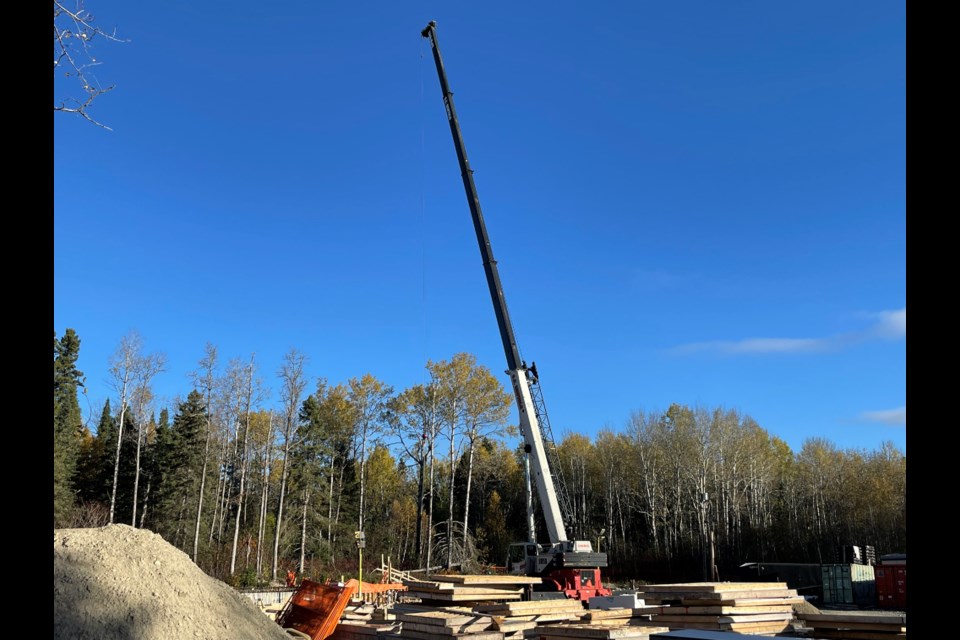BIIGTIGONG NISHNAABEG — Residents of Biigtigong Nishnaabeg First Nation (Pic River), on the north shore of Lake Superior, are set to enjoy greatly improved access to clean water thanks to an expansion of water treatment services.
“We’re actually right dead smack in the middle of the construction phase of the water treatment project,” said capital housing director Dan Michano.
The last time Dougall Media reporters spoke to officials from Biigtigong Nishnaabeg about the water treatment facility, things were just about wrapped up in the design phase but approval had not yet been granted by the provincial government.
Now, with the design approved and tendering phase over with — resulting in $58 million in funding awarded to Biigtigong Nishnaabeg to finance the project — the northern First Nation is well on track to seeing this new water treatment become a reality.
“It was almost surreal,” said Michano. “Knowing that we did it. We did all the hard work, all the push from various groups and programs… [now] we can finally see the light at the end of the tunnel.”
With workers and machines on site, foundations are on their way to being laid and progress is being made every day.
“They’re actually just completing the reservoir portion, where all of the above ground [work] is still yet to come… a lot of the actual in-ground pipe, in-ground infrastructure is being applied now until freeze up,” Michano said.
The new reservoir is going to be about “four to five times” larger in volume than the capacity at Biigtigong Nishnaabeg’s current facility, featuring “bigger and better flow rates.”
“Our team has been very diligent in their ability to produce potable water,” said Michano. “We were very diligent in reducing the amount of times we had boil water issues. And, of course, our boil water issues were directly related to the size of the reservoir, where our system just wasn’t able to keep up to the demand of the community.”
An increase in water flow means easier access and less risk, perhaps elimination of boil water advisories for the foreseeable future. The expanded capacity will accommodate not only current residents but also those moving back to Biigtigong Nishnaabeg when the new Generation PGM mining operation gets underway.
“We’re building new infrastructure, adding new infrastructure constantly,” said Michano. “We just ran out of volume.”
And carefully growing infrastructure is something that Biigtigong Nishnaabeg is invested in.
“I think we’re roughly about 173 homes,” said chief executive officer Debi Bouchie. “We don’t want to expand too quickly… we want to really phase in the opportunity for us to build new homes.”
On that note, the new community school also stands to benefit greatly from this crucial infrastructure update.
In the meantime, the school has a reservoir of its own that has been built into the grounds which it can draw from until the new treatment facility is completed.
Looking at timelines, Michano sounded optimistic that the new water treatment facility will be flowing by the end of 2024.
“Next November — nearing the end of November, early December — is when they’re looking to hand over the keys [and] when we’ll begin to finally receive [water] from our renewed source, which is Lake Superior.”
In terms of longevity, Michano assured that the new reservoir will work to serve the community’s long-term plans.
“I think the lifespan of this is closer to 50 years,” said Michano, “as opposed to what we just currently went through — a 30-year phase of the existing plant. So, we’re pretty excited and we’re pretty overwhelmed with what we’ve been granted.”
“This water project that we have will provide safe, reliable drinking water for generations to come,” said Bouchie. “And that was important for us, to be able to put that foundation [down] as well — for our generations who are going to be after us, taking care of our community and helping us build, helping us get even bigger and stronger. We needed to give them the tools to be able to do that and… [water] is a base necessity of life, so that was important for us to get that done.”
— SNnewswatch




